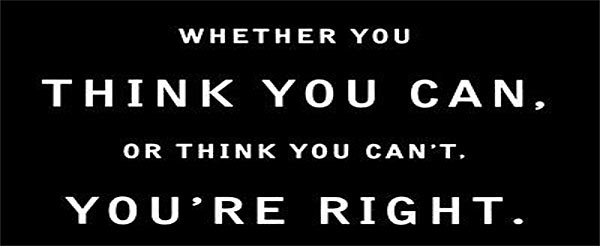Motivation
8 Ways To Increase Your Mental Strength
Editor’s Note: Wanha from Reddit, shares his advice on what it takes to increase mental toughness.
I’ve always been fascinated with mental toughness and athletes who possess it, and I’ve spent many years trying to understand this topic.
Much of our physical ability is determined by our body structure. I can train as much as I want, but I’ll never beat Usain Bolt in a footrace. Mental toughness, on the other hand, is something that can be learned and cultivated, it can be forged through practice and struggle. Naturally some people are born with a higher level of mental toughness than others, but on the whole it’s a skill that anyone can cultivate to a relatively high level.
Mental toughness is the ability to perform at an optimal level when the stakes are at their highest. Whether that means closing a huge sale or fighting back from the brink of defeat, mental toughness means we don’t allow the situation to overwhelm us emotionally.
One of the most respected NFL coaches, Bill Belichick, defines mental toughness as
“doing what’s right for the team regardless of how you might be feeling at the time.”
In other words, mental toughness is about sacrifice, doing something that’s difficult, pushing past your threshold, playing injured or playing a role you might not be comfortable playing. It’s about putting the team first.
But talking about mental toughness is easy. For every athlete that is mentally tough, there are probably ten athletes that aren’t.
So how do we improve our mental toughness?
Control Your Mind Or It Will Control You
Boiled down to its most basic elements, mental toughness comes down to two choices: to control your mind, or to let your mind control you.
When we don’t control our minds, we accept whatever programming that has been inputted earlier. You see, most of us never chose our current mental programming, we simply stumbled onto it, and now it’s the way we deal with life’s various challenges and situations.
For example, if your default reaction to high-stake moments is fear, anxiety or over-excitment, it’s because somewhere down the line you learned that that strategy works for you. That’s obviously not a particularly smart strategy, but at the time when you accepted it as part of your programming it was clearly good enough. And once we accept a programming, we usually stop thinking about it and it becomes our default reaction for similar situations.
So if we want to increase our mental toughness, we are going to have to do a little reprogramming of our minds first. From my experience, the key to being mentally tougher is to control your focus and eliminate the little voice of doubt and critique.
It’s All in Your Mind
Most articles you will find on this topic break mental toughness down into various subcategories, such as focus, poise, confidence, courage, and so forth. Although that may make sense from a scientific perspective, I’ve found that such an approach makes it difficult for the average person to put any of the advice to use.
So what follows is my attempt to provide an easier and more natural process to help you perform better when it really counts. I’ve successfully used these techniques myself over the past few years and I believe they can do the same for you.
Let’s get to them.
I. Be Positive. I Mean REALLY, REALLY POSITIVE
It’s easy to get down on yourself and let the inner critic run free when things aren’t going well, but that isn’t going to help you.
Instead, fight the urge to criticize and ask yourself if you can make a commitment that you will only bring forth positive energy for the remainder of the match. I’ve found that when you prioritize eliminating all negative thoughts, your focus automatically shifts to the positive ones, and that in turn makes you more likely to enjoy and excel in the big moment.
II. Focus Only On What You Control
Yes, we play to win, that’s why we keep score. But spending time thinking about the potential outcome just diverts your focus and fills your head with unimportant, distracting thoughts.
The remedy is to be present in the moment and let nature take its course. Focus only on the things you actually control: your approach and your attitude. What happens after the next point or after the match doesn’t matter. I’ve found this approach helps me relax, focus and play my best at the key moments.
III. Keep Your Emotional Level Steady
Some of us get more easily up and down that others. The more up and down you get, the more likely you are going to get over-excited or overwhelmed by the situation, and that puts you in a bad spot to win the big points consistently.
The key is to distance yourself from the game just enough so that you’re not swept away with the emotional tides. Don’t only focus on not getting down – also make sure you don’t get too high either, because that disrupts your focus also. Visualize remaining calm and composed in even the biggest situations. Act like you’ve been in those situations a hundred times, and eventually you’ll feel like it too.
IV. Enjoy The Big Moments
This is probably my favorite technique because it takes a moment that is stressful and intimidating and turns it into a moment that’s fun and exciting – something you actually look forward to.
The next time you find yourself in a big moment in a game (e.g. a tiebreak in tennis), remind yourself how exciting and fun these big moments are compared to a casual game with nothing at stake. These are the moments you’ll remember and what you’ll all discuss after the games – enjoy them, embrace them, and feel them with every cell in your body.

V. A Prepared Mind is a More Confident Mind
It’s been said that self confidence is ‘your ability to influence the world around you’. What better way to do that than through practice?
When you know you’ve practiced a single shot a thousands of times, you have a lot more faith in being able to rely on your training in a big moment. You don’t need to ‘will’ yourself to do something that has very little chance of succeeding. Remind yourself that all that sweat and sacrifice was a price you paid so you could be victorious today.
VI. Forget About How You Might Look
Sometimes we start thinking how bad we might appear to others if we lose this point – or how embarrassing it would be to blow a big lead. But the moment you start thinking from the outside in, you lose your focus and your ability to stay calm and composed.
Thinking from the outside in is toxic. You are not doing this to “look good” or win the admiration of onlookers, so put all thoughts about looking bad out of your mind and just focus on playing the game one point at a time. Win or loss – do it your way.
VII. Have a Short Memory
This is also one of my favorites. It’s so easy to get angry and criticize ourselves when we make a mistake, but all that usually does is turn one bad play into another.
If the previous point or play didn’t go your way, you need to forget it immediately and concentrate on the next one. Don’t let one bad play ruin the next one.
Just make a note and move on.
VIII. Don’t Expect Perfect Circumstances
It’s easy to say the conditions were poor, you had a little ailment or that nothing is going your way today. But these are all just excuses that tempt you down the road of surrender.
You only get the perfect circumstances so many times in life. Don’t dwell on what has gone against you. Don’t worry that the conditions favor your opponent. Ignore the pain you feel in your knee.
What you have is what you have. There will never be another chance to win this game.
Be like MacGyver and use everything that you have at your disposal to succeed right now.
Mental toughness is really just about approaching the game from the right perspective. The next time you step out onto the field, ignore the score, focus being in the moment and tell that little, criticizing and excuse-seeking voice in your head to shut the hell up. You’ll be glad you did.

Life
10 Research-Backed Steps to Create Real Change This New Year
This New Year could finally be the one where you break old patterns and create real, lasting change.

Every New Year, we make plans and set goals, but often repeat old patterns. (more…)
Life
How Sports Quietly Build Kids’ Emotional Intelligence And Why It Matters for Life
Sports create a natural loop of awareness and action that kids carry into real life

A missed shot in basketball. A tumble during a gymnastics routine. A tough loss in karate sparring. These moments can feel huge to a child, sparking frustration, embarrassment, or even tears. (more…)
Did You Know
7 Surprising Life Lessons Video Games Taught Me That School Never Did
Want to get better at something? Study the pros. That applies to both life and video games

If you play video games, you’ll quickly discover you’re not alone. You’ll meet people who share your interests, challenge your skills, and even teach you something new about yourself. I started gaming when I was 10. A classmate invited me to play after school, and I was hooked. (more…)
Featured
The Psychology of Motivation: How to Keep Moving Forward Every Day
Discover how daily habits, self-discipline, and a few clever strategies can spark your drive and focus.

You wake up on a typical Monday morning, glance at your clock, and realize it’s time to get moving. How do you summon that inner drive to deal with your responsibilities with a genuine smile on your face? (more…)
-

 News3 weeks ago
News3 weeks agoBrandon Willington Builds 7-Figure Business by Ignoring Almost Everything
-

 Health & Fitness3 weeks ago
Health & Fitness3 weeks agoWhat Minimalism Actually Means for Your Wellness Choices
-

 Did You Know3 weeks ago
Did You Know3 weeks agoWhy Most Online Courses Fail and How to Fix Them
-

 Business3 weeks ago
Business3 weeks agoIf Your Business Internet Keeps Letting You Down, Read This
-

 Business2 weeks ago
Business2 weeks agoEntrepreneur’s Guide to Pay Stubs: Why Freelancers and Small Business Owners Need a Smart Generator
-

 Business1 week ago
Business1 week agoThe Salary Shift Giving UK Employers An Unexpected Edge
-

 Business2 weeks ago
Business2 weeks agoThe Simple Security Stack Every Online Business Needs
-

 Scale Your Business2 weeks ago
Scale Your Business2 weeks ago5 Real Ways to Grow Your User Base Fast






























25 Comments